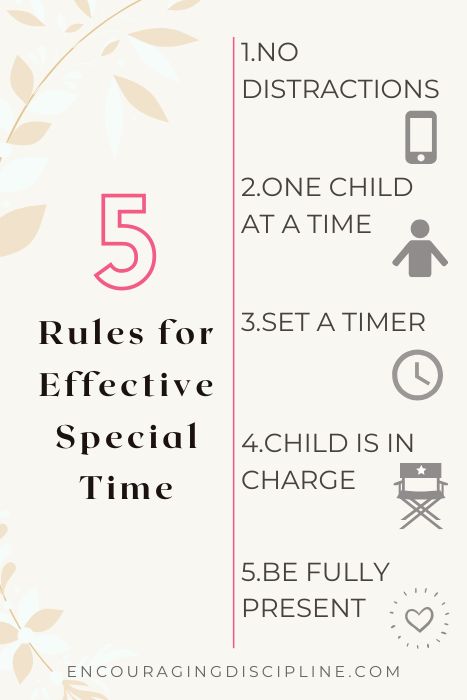How to Get Better Behavior With Special Time
Special Time can transform your relationship with your child. It is a simple Positive Discipline Tool that can take as little as 10 minutes a day. Your child will begin to listen and cooperate more. In this post, you will learn all about how to implement Special Time in a way that will get you the best results.
“My child is defiant. He won’t listen to me. I have to ask him 20 times to do something and he just ignores me. My daughter’s friends matter more to her than her family. My son doesn’t share with his brother.” What do all these statements have in common? A child who does not behave according to their parents’ expectations.
Table of Contents
A misbehaving child is a discouraged child.
Dr. Jane Nelsen, Positive Discipline
How can we encourage a child? By creating connection. And how do we create more connection? One way is to give them attention.
Our children crave our attention. Unfortunately, the demands of our daily lives leave us depleted. Sometimes it feels like we don’t have any more time in the day for any extra thing to do. But today I am going to tell you about a Positive Discipline Tool that will gain you so much time, you won’t believe it! This is Special Time.
Why do our children crave our attention so much? Because to them, attention equals love, significance, and importance.

When we give our children the attention they need, they feel more connected to us and they feel like they matter. Therefore they are more likely to listen to us and do things for us when we ask them. And they do what we ask them not because they are afraid of us, but because they value our relationship and they want to do it.
You may already be spending time with your child: you read to him, you take him to the park, you run errands together, you talk to him about what he did in school, you have a bedtime routine, you have dinner together, you may even play a game of Monopoly every now and then. And all these are great opportunities to be fully present and infuse connection with your child.
But here is how Special Time is different: it is not “mandatory” time spent on things you have no choice but doing. This is where I include driving together, taking them to sports classes, or doing homework with them. Then there is “casual” time, such as reading, having dinner together, or talking about their day.
Special Time is a scheduled time that the child is looking forward to, it is a time that you interact mindfully, and you both truly enjoy. You have to be fully present for this experience. By that I mean, you are not cooking dinner while you are talking with your child, and you are not checking your phone during your game of Monopoly. You are fully immersed and present in the moment, just as your child is.
How Does Special Time Work?
This is how you do it:
- Eliminate all distractions: silence your phone and put it out of sight, turn off the stove, make sure siblings will not interrupt (are in someone else’s care, preferably), etc. Do what you have to do to ensure that your time will not be interrupted.
- Secondly, each child receives Special Time individually.
- The third point is to decide on a limited amount of time and set a timer.
- Fourth, your child is in charge and decides what you will play and what the rules are.
- And the final requirement is to be fully present and enjoy this time with your child.

How Much Time Is Needed?
When children are very young, they may not understand the concept of spending dedicated time together. But after the age of two, you can start Special Time with them. Here is how much time children need at different ages:
- Between the ages of 2 and 6 – a minimum of 10 minutes daily
- Between the ages of 7 and 12 – at least 30 minutes per week
- For children 13 and up – at least once a month.
Of course, your children would love more than that. And if you have the time and stamina, by all means, give it to them. But, if it is hard for you to find more time in your day, aim for the minimum that is recommended here.
Tips – Set yourself up for success
☛ Pick an amount of time you know you can stick with. Once you have decided on what you can offer, communicate this to your child and set a timer to show that you are not allowing anything to get in the way.
☛ Choose a time of week and day when you know you can be relaxed and enjoy this time with your child.
Who Does What?
Let your child know that she is in charge and she gets to choose how to spend this time with you. You want your child to look forward to your time together, and this is a good way to do it.
Children spend most of their day following our directions. They love the reversal of the roles, where they get to be in charge. Not only do they get a kick out of bossing us around, but by giving our child the power, we get to learn about what he likes to do and play (which changes all the time), and we also learn about issues with friends or things that bother him. When our child feels safe, thoughts and emotions that need to be resolved will very likely come up.
The most important rule is: refrain from trying to solve problems, correcting or directing the play in any way! Your child is the playwright, the director, and the actor, and you are just the sidekick.
Your only responsibility as a parent is to keep everyone safe. Beyond that, you lovingly immerse yourself in your child’s play and let them know how much you are enjoying this time with them. Look at your child with a beginner’s eye. Try to hear the way they speak, see the way they move, as if you see them for the first time in a long while. Soak it all in. Your child will sense your enthusiasm and thrive on it.
Why Does Special Time Work?
It is effective because children feel that they are important to us, and we are willing to dedicate this time to just them. Also, the reversal of the roles satisfies the children’s need for power, it helps them to feel accepted by their parent, and it gives them the opportunity to bring up unresolved issues that challenge them.
Here are only some of the benefits of doing Special Time with your child:
- It strengthens your relationship
- Is healing for the child
- Children thrive in our loving presence and full acceptance
- It reminds us why we love our children.
Related: How to Reduce Sibling Fights
Frequent Questions
What if I am a single parent and I can’t find time to do this individually?
This may be hard for a single parent of multiples or for a parent who is by herself or himself with the children for the majority of the day. You’ll have to be creative to find ways to spend a few minutes at a time with each child.
Here are some ideas for how to schedule your Special Time:
- You can ask someone to watch one of the children.
- If one of your children goes to bed before the other, you have a little window before bedtime. But this shouldn’t replace the bedtime routine.
- If one of your children wakes up before the other, you can use that time.
- Or if one child naps, but the other one doesn’t, that is a perfect chunk of time you can take advantage of.
- Another idea is if your children are in school at different times.
- If this is impossible, then you can involve both children, but you have to make it very clear whose Special Time it is, and who makes the rules. You will have to train the other child to follow the rules and decisions that are given to both of you.
What if my child has a meltdown when the time is up because she is not ready to stop playing?
Many times children will not be ready to stop playing. This can happen for two reasons.
One is that they are so thirsty for our attention, that what we were able to give them was not enough to fill their cup.
Another reason why they may have a meltdown is that they have some big feelings that need to come out and heal. The safety that we offered them during Special Time allowed them to become vulnerable enough to open up and heal those feelings in our loving presence.
So what do we do? We make sure our child is feeling Safe. Then we Connect by empathizing, allowing, and accepting. We welcome all emotions as they come.
There is no real need to ask the child what his tears were about. Children are not always able to identify what causes their big feelings. Just know that, once they are out, they are most probably resolved.
Tip
If you notice that your child frequently has an emotional dump at the end of Special Time, make sure to build that time in. Let’s say you know you only have 30 minutes to spare every Saturday, and you noticed your child’s meltdown lasts for about 20 minutes. Then you offer 10 minutes for Special Time. And when it ends, you can expect to spend another 20 minutes welcoming your child’s emotional healing process.
With time, the emotional moments will decrease and slowly disappear. Know that they are also part of connection building. Your child will feel closer to you if you receive his emotions with empathy.
Conclusion
Spending this dedicated time together will help your child to grow more attached to you, and it will build more trust.
With time, you will notice that your child will get along better with his siblings and friends, will become more cooperative, will listen more, and will share more of what’s going on with him.
When our children feel like they matter and are securely attached to us, they value our relationship and are willing to invest more in it.
I know it may feel hard right now to try Special Time. It may feel like more time and energy that you have to invest in raising your child. But trust the process. Your investment will come back multiplied. Give it a try and let me know in the comments what the results are.







